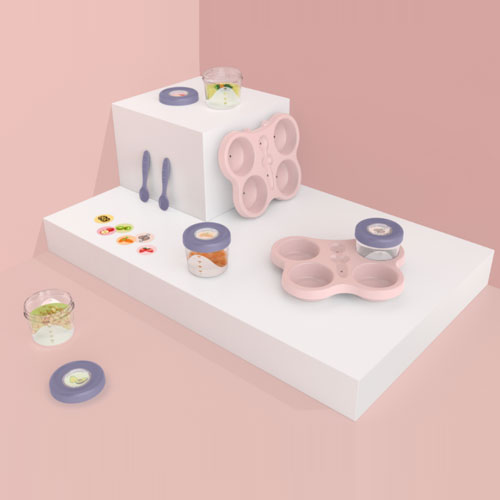Guidelines for storing baby food
2023-11-03
Proper baby food storage is essential to ensure your baby's safety and to maintain the nutritional quality of the food. Here are some guidelines for storing baby food:
1. Refrigeration:
- Store homemade baby food in airtight containers or ice cube trays in the refrigerator.
- Keep the temperature of your refrigerator at or below 40°F (4°C).
- Use the food within 24 to 48 hours to maintain freshness and reduce the risk of spoilage.
2. Freezing:
- If you want to store baby food for a longer period, freezing is a good option. Use a dedicated freezer or a separate section of your freezer for baby food storage.
- Portion the food into small containers or ice cube trays. Ice cube trays are great for creating small, easy-to-thaw portions.
- Make sure to label the containers with the date of preparation and the type of food.
- Follow recommended freezing times for specific types of baby food. Generally, purees and solids can be safely frozen for 1-3 months.
3. Thawing:
- When you're ready to use frozen baby food, transfer it from the freezer to the refrigerator and allow it to thaw slowly. This helps maintain the food's nutritional value.
- Alternatively, you can use a microwave or a bowl of warm water to thaw the food. Be sure to test the food's temperature to avoid overheating.
4. Avoid Repeated Thawing and Refreezing:
- Once you've thawed baby food, it's best to use it within 24 hours. Avoid refreezing thawed food as it can impact the texture and flavor.
5. Safety Tips:
- Always practice good hygiene when handling baby food, including washing your hands, utensils, and food containers thoroughly.
- Discard any leftover baby food that your baby has not eaten within the recommended timeframe to prevent spoilage or contamination.
6. Check for Spoilage:
- Before serving baby food, inspect it for any signs of spoilage, such as off smells, unusual colors, or visible mold. If in doubt, it's best to discard it.
7. Commercial Baby Food:
- Commercially prepared baby food typically comes in sealed jars or pouches and can be stored at room temperature until opened. Once opened, follow the storage instructions on the packaging, which usually recommend refrigeration and using within a certain timeframe.
Remember to consult with your pediatrician or healthcare provider for specific recommendations on storing baby food, as some foods may have different guidelines based on your baby's age and dietary needs. Proper storage and handling of baby food are crucial to ensure the health and safety of your child.



